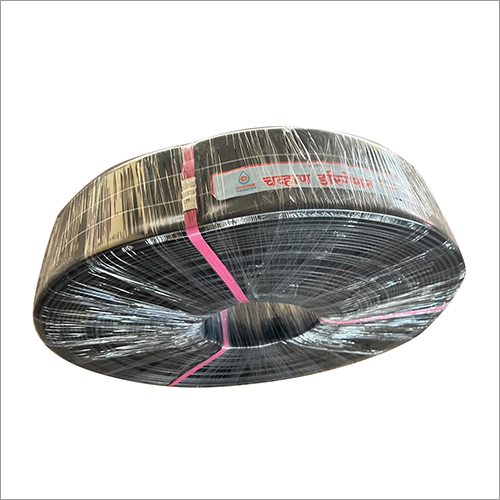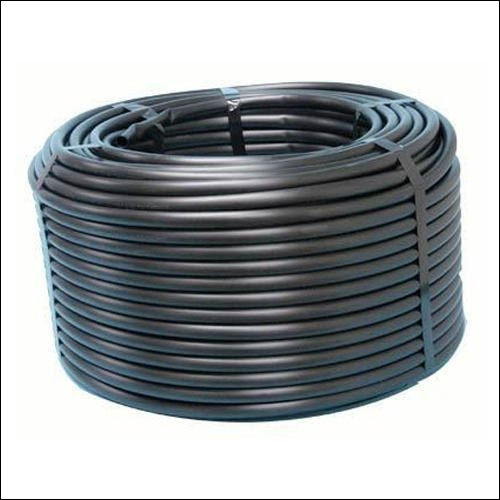Call Us : 08045814301


Black Flexible Irrigation Pipes
3.00 - 6.00 INR/Meter
Product Details:
- Product Type Black Flexible Irrigation Pipes
- Material Rubber
- Application Agriculture
- Click to view more
X
Black Flexible Irrigation Pipe Price and Quantity
- 3.00 - 6.00 INR/Meter
- 100 Meter
Black Flexible Irrigation Pipe Specifications
- Agriculture
- Rubber
- Black Flexible Irrigation Pipes
Black Flexible Irrigation Pipes Trade Information
- Cash Advance (CA)
- 10 Days
- All India
Product Description
Black Flexible Irrigation Pipes are designed to connect with other pipes in a quicker time at economical rates. These pipes are well known for its chemical resistance, corrosion resistance and leak free joints. They do not require high pressure and able to manage in an efficient way. Black Flexible Irrigation Pipes are light in weight and easy to transport in a hassle manner. These pipes prevent soil consolidation and required for pumping water.
Flexible Irrigation Pipe Features:
1. Versatility: Flexible irrigation pipes can be used in a variety of irrigation systems, including drip irrigation, soaker hoses, and more. Their flexibility allows them to adapt to different layouts and terrains, making them suitable for both residential and commercial settings.
2. Ease of Installation: These pipes are relatively easy to install and require minimal tools. They can be laid out above or below the ground, depending on the specific irrigation needs.
3. Durable Materials: High-quality flexible irrigation pipes are often made from durable materials like UV-resistant polyethylene (PE) or polyvinyl chloride (PVC), which can withstand prolonged exposure to sunlight and harsh weather conditions.
4. Customizable Lengths: These pipes are often sold in various lengths, allowing users to cut and customize the pipe lengths to suit their specific irrigation layout without the need for complex fittings or connectors.
5. Flexibility and Bend Radius: The key advantage of flexible irrigation pipes is their flexibility, which enables them to be bent around obstacles, trees, and other landscaping features without the need for joints or connectors.
6. Water Conservation: Flexible irrigation pipes are commonly used in drip irrigation systems, which provide targeted and localized watering directly to the plant's root zone. This efficient method of irrigation helps minimize water wastage.
7. Low Maintenance: Due to their simple design and efficient water delivery, flexible irrigation pipes generally require less maintenance than traditional sprinkler systems.
8. Even Water Distribution: Drip hoses and pipes are designed to provide even water distribution along their length. This helps prevent overwatering or underwatering in different areas of the landscape.
9. Cost-Effective: Flexible irrigation pipes are often more cost-effective compared to complex underground sprinkler systems. They require fewer components and can be easily replaced if needed.
10. Eco-Friendly: The water efficiency of flexible irrigation systems contributes to water conservation, making them environmentally friendly options for irrigation.
11. Reduced Weed Growth: Drip hoses deliver water directly to the plant roots, minimizing water exposure to surrounding soil and reducing weed growth in non-planted areas.
12. Compatibility: These pipes can be used in conjunction with various irrigation components, such as emitters, connectors, filters, and pressure regulators, allowing for a tailored irrigation setup.
13. Ease of Storage: Flexible irrigation pipes can be rolled up and stored when not in use, taking up minimal space compared to more rigid irrigation systems.
Applications of Flexible Irrigation Pipe:
1. Drip Irrigation: Drip irrigation is one of the primary applications of flexible pipes. These pipes deliver water directly to the root zone of plants through emitters or tiny holes along the length of the pipe. This method reduces water wastage, minimizes evaporation, and ensures targeted watering.
2. Soaker Hoses: Flexible pipes with porous walls, known as soaker hoses, are used to provide gentle and consistent water seepage along their length. They are often laid on the soil surface or buried slightly beneath it. Soaker hoses are excellent for garden beds, flower borders, and areas with dense planting.
3. Row Crop Irrigation: Flexible pipes are commonly used in row crop farming, such as vegetable fields, orchards, and vineyards. They can be positioned along rows of plants, delivering water directly to the base of each plant.
4. Landscape Beds: Flexible pipes are ideal for irrigating landscaping beds with various plants, shrubs, and flowers. Their flexibility allows them to be easily shaped around landscaping features and provide targeted irrigation.
5. Greenhouses: In controlled environments like greenhouses, flexible irrigation pipes can be used to deliver water to potted plants, hanging baskets, and other containers, ensuring precise and efficient irrigation.
6. Nurseries: Plant nurseries often utilize flexible irrigation pipes to water a large number of plants efficiently. They can be customized to fit different nursery layouts and pot sizes.
7. Ornamental Gardens: Flexible pipes are a great choice for watering ornamental gardens and flower beds where aesthetics are important. Their discreet placement and water-efficient delivery help maintain the beauty of the landscape.
8. Hedgerows and Windbreaks: In agricultural settings, flexible pipes can be placed along hedgerows and windbreaks to provide water to plants that serve as barriers against wind and erosion.
9. Container Gardening: For containers and hanging baskets, flexible pipes can be incorporated to ensure consistent and controlled watering without the risk of overwatering.
10. Terraced Landscapes: In terraced landscapes or sloping gardens, flexible irrigation pipes can be installed at different levels to ensure uniform water distribution across the entire area.
11. Remote or Hard-to-Reach Areas: Flexible pipes are useful for irrigating areas that are difficult to access, such as remote fields or steep terrain, where traditional irrigation methods might be impractical.
12. Renovation and Construction Sites: During landscaping projects or construction, flexible pipes can provide temporary irrigation solutions for establishing new vegetation or maintaining existing plants.
13. Water Conservation Projects: Flexible irrigation pipes can be a part of water conservation initiatives by providing efficient water delivery to drought-resistant plants and native landscapes.
FAQ:
Q. What is a flexible irrigation pipe?
Ans: A flexible irrigation pipe is a hose-like tube designed for efficiently distributing water to plants. It is commonly used in drip irrigation systems to deliver water directly to the root zone of plants.
Q. How does a flexible irrigation pipe work?
Ans: Flexible irrigation pipes work by transporting water from a water source to the plants through emitters or holes along the pipe's length. Water is released in controlled amounts, minimizing wastage and providing targeted irrigation.
Q. What are the advantages of using flexible irrigation pipes?
Ans: Flexible irrigation pipes offer benefits such as easy installation, adaptability to various layouts, water conservation, even water distribution, low maintenance, and suitability for various applications.
Q. Where can I use flexible irrigation pipes?
Ans: Flexible irrigation pipes are used in applications like drip irrigation, soaker hoses, row crop farming, landscaping beds, greenhouses, nurseries, ornamental gardens, and more.
Q. Can I use flexible irrigation pipes for above-ground and below-ground irrigation?
Ans: Yes, flexible irrigation pipes can be used for both above-ground and below-ground irrigation. They are versatile and can be adapted to different settings.
Q. How do I install flexible irrigation pipes?
Ans: Installation involves laying the pipes along the desired irrigation lines, securing them in place using stakes or anchors, connecting them to a water source, and adding necessary components like emitters and connectors.
Q. What types of plants are best suited for flexible irrigation pipes?
Ans: Flexible irrigation pipes are suitable for a wide range of plants, including vegetables, flowers, shrubs, fruit trees, and ornamental plants.
Q. Are flexible irrigation pipes adjustable in length?
Ans: Yes, many flexible irrigation pipes come in various lengths, and you can cut them to the desired size to fit your irrigation layout.
Q. What maintenance is required for flexible irrigation pipes?
Ans: Regular maintenance involves checking for clogs, leaks, and proper water flow, as well as cleaning or replacing emitters as needed. Proper winterization might be required in colder climates.
Q. Are flexible irrigation pipes suitable for water conservation?
Ans: Yes, flexible irrigation pipes, especially in drip irrigation systems, are known for their water-efficient delivery, which contributes to water conservation efforts.
Q. Can flexible irrigation pipes be used with automated irrigation systems?
Ans: Yes, flexible irrigation pipes can be integrated into automated irrigation systems using timers, controllers, and valves for scheduled watering.
Q. How long do flexible irrigation pipes typically last?
Ans: The lifespan of flexible irrigation pipes depends on factors like the quality of materials, UV resistance, and maintenance. Generally, high-quality pipes can last for several years.
Q. Can I use flexible irrigation pipes for sloped landscapes?
Ans: Yes, flexible irrigation pipes are suitable for sloped or terraced landscapes. They can be installed at different levels to ensure even water distribution.
Q. Are there different sizes and materials available for flexible irrigation pipes?
Ans: Yes, flexible irrigation pipes come in various sizes and materials, such as PVC, PE, and rubber. Choosing the right size and material depends on your specific needs.
Q. Can I reuse flexible irrigation pipes in different areas?
Ans: Yes, flexible irrigation pipes can be reused and repositioned in different areas as long as they are in good condition.
Enter Buying Requirement Details







